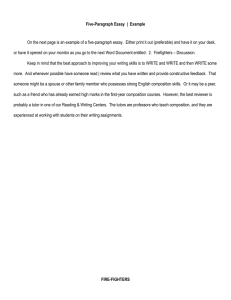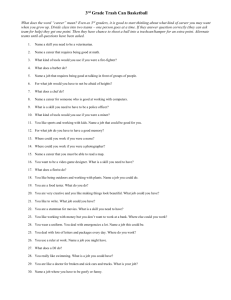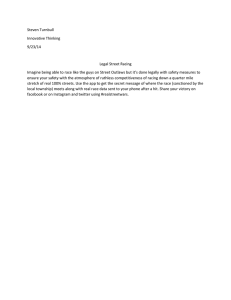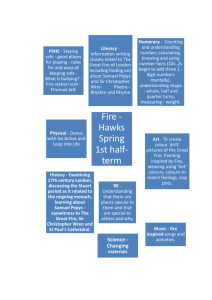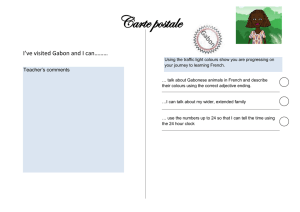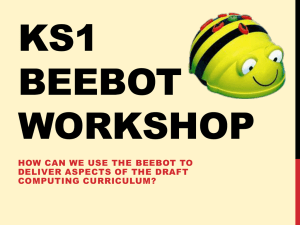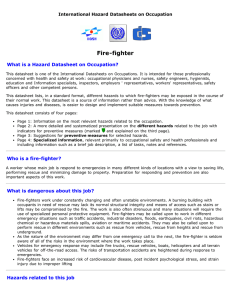LEARNING ENVIRONMENT THE BIG PICTURE/LEARNING OUTCOMES P.E/PHYSICAL DEVELOPMENT & MOVEMENT
advertisement
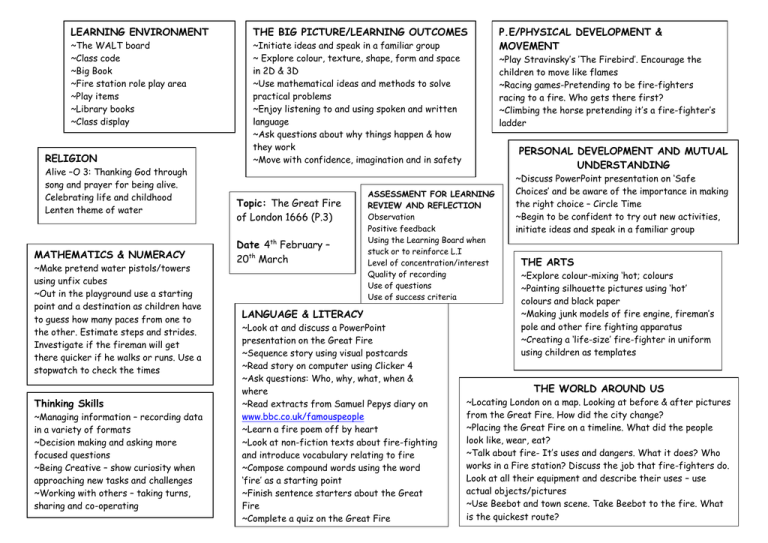
LEARNING ENVIRONMENT THE BIG PICTURE/LEARNING OUTCOMES ~The WALT board ~Class code ~Big Book ~Fire station role play area ~Play items ~Library books ~Class display ~Initiate ideas and speak in a familiar group ~ Explore colour, texture, shape, form and space in 2D & 3D ~Use mathematical ideas and methods to solve practical problems ~Enjoy listening to and using spoken and written language ~Ask questions about why things happen & how they work ~Move with confidence, imagination and in safety RELIGION Alive –O 3: Thanking God through song and prayer for being alive. Celebrating life and childhood Lenten theme of water MATHEMATICS & NUMERACY ~Make pretend water pistols/towers using unfix cubes ~Out in the playground use a starting point and a destination as children have to guess how many paces from one to the other. Estimate steps and strides. Investigate if the fireman will get there quicker if he walks or runs. Use a stopwatch to check the times Thinking Skills ~Managing information – recording data in a variety of formats ~Decision making and asking more focused questions ~Being Creative – show curiosity when approaching new tasks and challenges ~Working with others – taking turns, sharing and co-operating Topic: The Great Fire of London 1666 (P.3) Date 4th February – 20th March LANGUAGE & LITERACY ASSESSMENT FOR LEARNING REVIEW AND REFLECTION Observation Positive feedback Using the Learning Board when stuck or to reinforce L.I Level of concentration/interest Quality of recording Use of questions Use of success criteria Understanding and P.E/PHYSICAL DEVELOPMENT & MOVEMENT ~Play Stravinsky’s ’The Firebird’. Encourage the children to move like flames ~Racing games-Pretending to be fire-fighters racing to a fire. Who gets there first? ~Climbing the horse pretending it’s a fire-fighter’s ladder PERSONAL DEVELOPMENT AND MUTUAL UNDERSTANDING ~Discuss PowerPoint presentation on ‘Safe Choices’ and be aware of the importance in making the right choice – Circle Time ~Begin to be confident to try out new activities, initiate ideas and speak in a familiar group THE ARTS ~Explore colour-mixing ‘hot; colours ~Painting silhouette pictures using ‘hot’ colours and black paper ~Making junk models of fire engine, fireman’s pole and other fire fighting apparatus ~Creating a ‘life-size’ fire-fighter in uniform using children as templates ~Look at and discuss a PowerPoint responding positively to presentation on the Great Fire stories and poems ~Sequence story using visual postcards ~Read story on computer using Clicker 4 ~Ask questions: Who, why, what, & success Usewhen of the THE WORLD AROUND US where criteria when evaluating ~Locating London on a map. Looking at before & after pictures ~Read extracts from Samuel Pepys diary on own work from the Great Fire. How did the city change? www.bbc.co.uk/famouspeople ~Placing the Great Fire on a timeline. What did the people ~Learn a fire poem off by heart look like, wear, eat? ~Look at non-fiction texts about fire-fighting ~Talk about fire- It’s uses and dangers. What it does? Who and introduce vocabulary relating to fire works in a Fire station? Discuss the job that fire-fighters do. ~Compose compound words using the word Look at all their equipment and describe their uses – use ‘fire’ as a starting point actual objects/pictures ~Finish sentence starters about the Great ~Use Beebot and town scene. Take Beebot to the fire. What Fire is the quickest route? ~Complete a quiz on the Great Fire ~Find out the origin of Ring O Rosies
